
Politics
22:24, 26-Sep-2017
Could Bahrain's overtures to Israel end in normalization?
CGTN
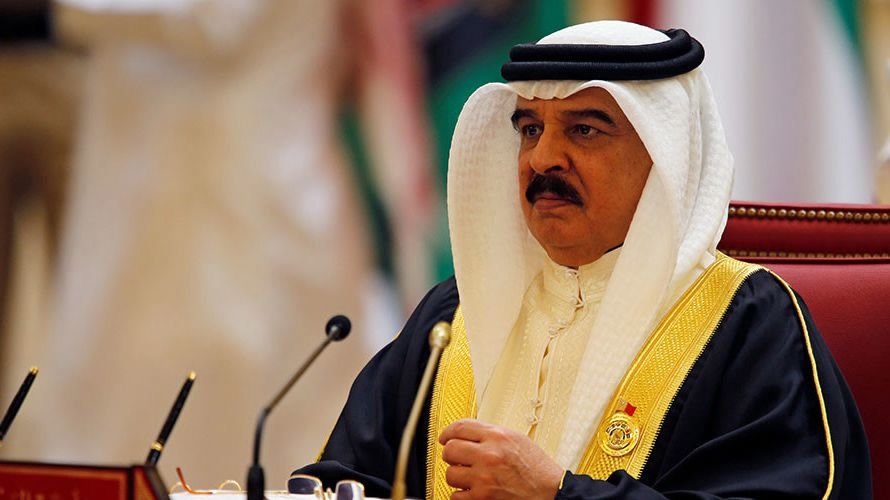
The tiny Gulf state of Bahrain has been making big headlines in recent weeks after a trickle of reports brought to the fore Manama’s not-so-covert overtures to Israel, with the latest news over the weekend predicting that normalization of ties could be announced as early as next year.
Bahrain, much like the majority of Arab states, has long championed the Palestinian cause and upheld a condemnatory rhetoric to Israeli occupation. But recent years have seen Manama softening its stance toward the Jewish state, which it had traditionally called the “enemy” and “Zionist state”, as it looked to counter Iran’s rise in the region.
As of late, the Arab country took its dealings with Israel outside closed doors and beyond off-the-record meetings, in what some have considered as a prelude to ending seven decades of boycott. Manama's moves coincided with Israeli Prime Minister Benjamin Netanyahu saying that his country is enjoying the "best ever" ties with Arab countries and that bilateral cooperation exists "in various ways and (at) different levels."
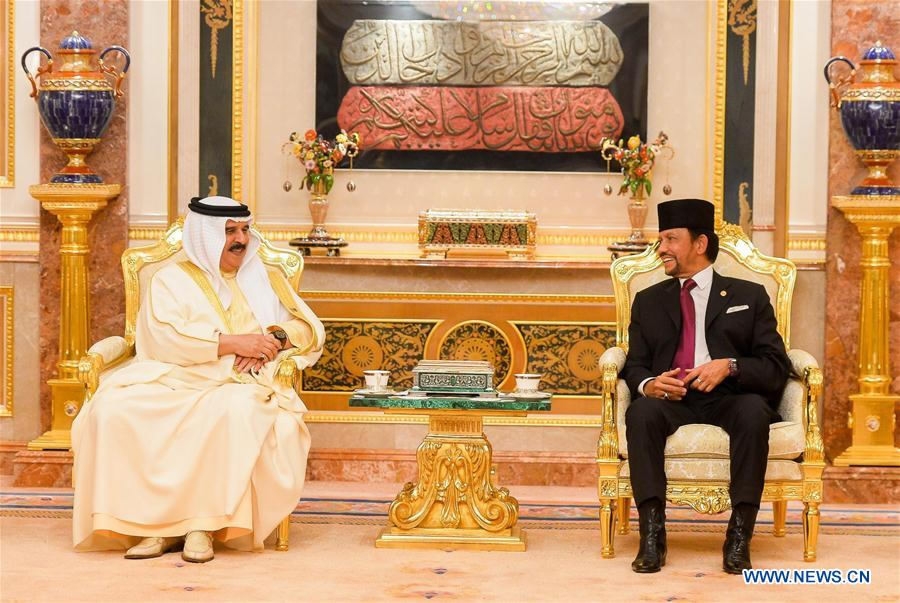
Bahrain's King Hamad bin Isa Al-Khalifa (L) meets with Brunei's Sultan Hassanal Bolkiah in Bandar Seri Begawan, capital of Brunei, May 3, 2017. /Xinhua Photo
Bahrain's King Hamad bin Isa Al-Khalifa (L) meets with Brunei's Sultan Hassanal Bolkiah in Bandar Seri Begawan, capital of Brunei, May 3, 2017. /Xinhua Photo
Official ties soon?
The London-based Middle East Eyes news portal quoted on Saturday an unnamed Western diplomat stationed in Bahrain as saying that the Arab state would go open about its official ties with Israel not “this year, maybe the year after.”
The official noted that “we will have official visits from ministers of trade and economic affairs,” but discarded the idea of opening embassies.
Certain countries in the Arabian Peninsula have previously expressed willingness to establish diplomatic relations with Israel but set peace between the Israelis and Palestinians as a precondition for such a move. With both sides not sitting at the negotiating table since 2014, a quick fix to the chronic issue does not seem to be looming in the horizon.
Regardless of their accuracy, forecasts that official ties could be publicized by 2018, certainly highlight the quickened pace at which the Persian Gulf state is cozying up to its Mediterranean neighbor. And if the fresh slew of reports is any indication, Manama’s hostility to Israel is turning into a love affair, despite frowns at home and across the region.
On Tuesday, the Times of Israel quoted a statement recently issued by the Bahraini Embassy in London, in which authorities openly and unprecedentedly expressed the possibility of their citizens visiting Israel.
“The kingdom of Bahrain has no issue or problem with any of its citizens or residents practicing their religion or visiting family or friends wherever that may be — which, of course, includes the State of Israel,” the news website cited the statement.
The announcement reiterated what was reported on behalf of the Bahraini King Hamad bin Isa Al-Khalifa earlier this month. He was quoted as saying he rejects the Arab boycott of Israel and intends to allow Bahrainis to freely visit Israel.
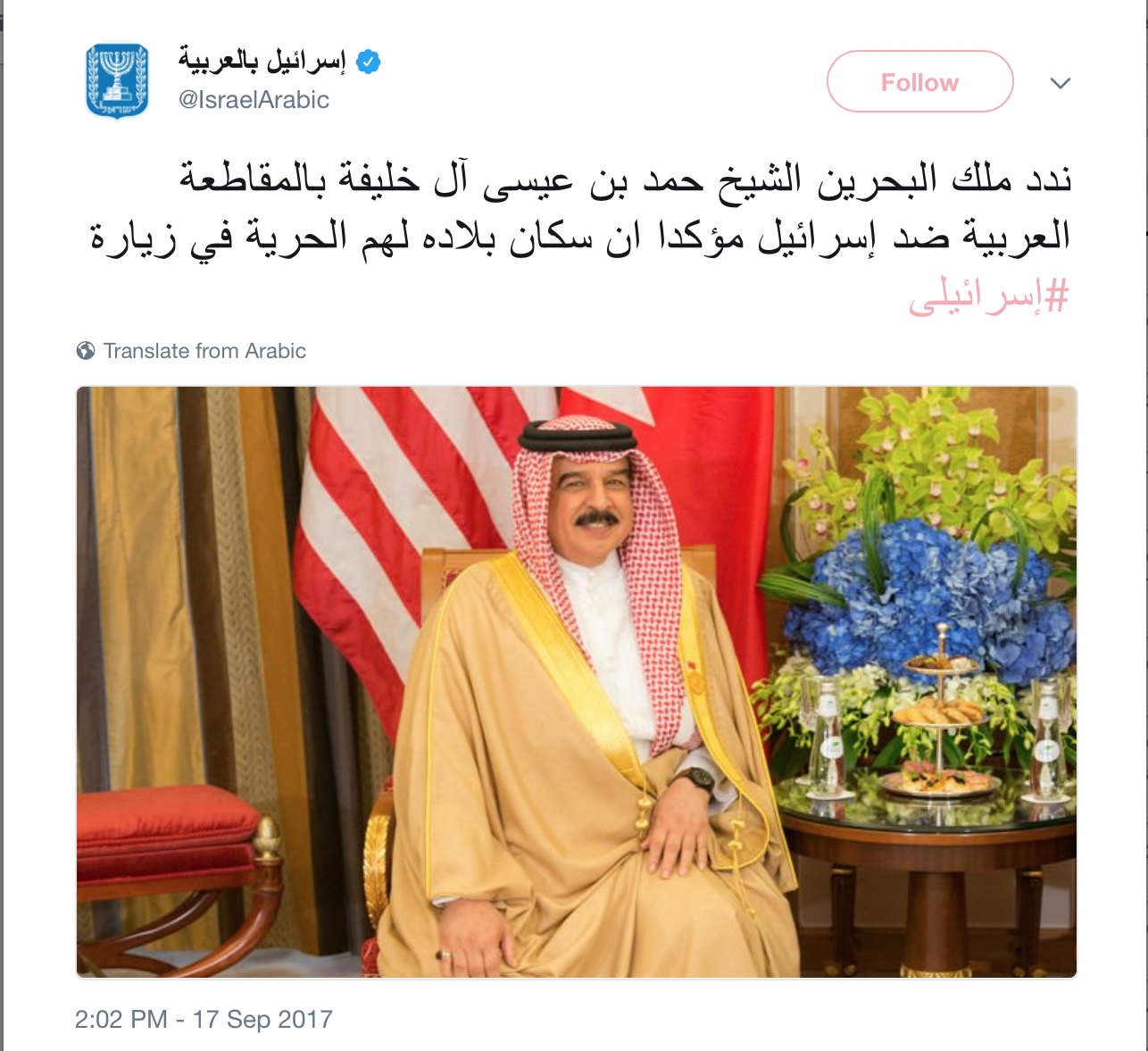
The now-deleted tweet of the Arabic-language account of Israel's Ministry of Foreign Affair.
The now-deleted tweet of the Arabic-language account of Israel's Ministry of Foreign Affair.
Despite no official confirmation or denial issued by Bahraini authorities, the king’s utterance was quickly picked by the Israeli Ministry of Foreign Affairs on its Arabic Twitter account in a now-deleted post.
"Bahrain's King Hamad bin Isa al-Khalifa denounced the Arab boycott against Israel and has confirmed that Bahraini citizens are now free to visit #Israel," the tweet read before being taken down.
Rallying with the rabbis
The words of the king were made public by Rabbi Marvin Hier, the dean and founder of the Los Angeles-based Simon Wiesenthal Center, and Rabbi Abraham Cooper, the associate director of the Los Angeles-based center, who met in February with the Bahraini monarch to discuss opening a museum for religious tolerance in Manama by the end of this year.
However, they only came out about what they were told two weeks ago.
The Jewish religious figures told Israeli media they decided to bring under the spotlight what they heard from the king after meeting his son, Prince Nasser bin Hamad Al-Khalifa in Los Angeles at an inter-faith event in mid-September.

Bahraini Prince Nasser bin Hamad Al-Khalifa. /Photo via Pinterest
Bahraini Prince Nasser bin Hamad Al-Khalifa. /Photo via Pinterest
The event, which intended to promote tolerance and acceptance among religions and reject extremism, also doubled as a political occasion to show Bahrain’s willingness to engage in public with Israel as signs that the gathering was closely affiliated with Israel were not kept under wraps.
The Manama-funded event was organized by the Weisenthal Center, which “no one will say is not so pro-Israel” according to the institution's head, Rabbi Hier. The Bahraini prince was photographed touring the “unabashedly pro-Israeli” Museum of Tolerance according to the Los Angeles Times and the Bahrain National Orchestra played Israel's national anthem the “Hatikva” after that of Bahrain and the US.
While flirting between the two countries has been happening for a while, exposing it for everyone to see has only been recent.
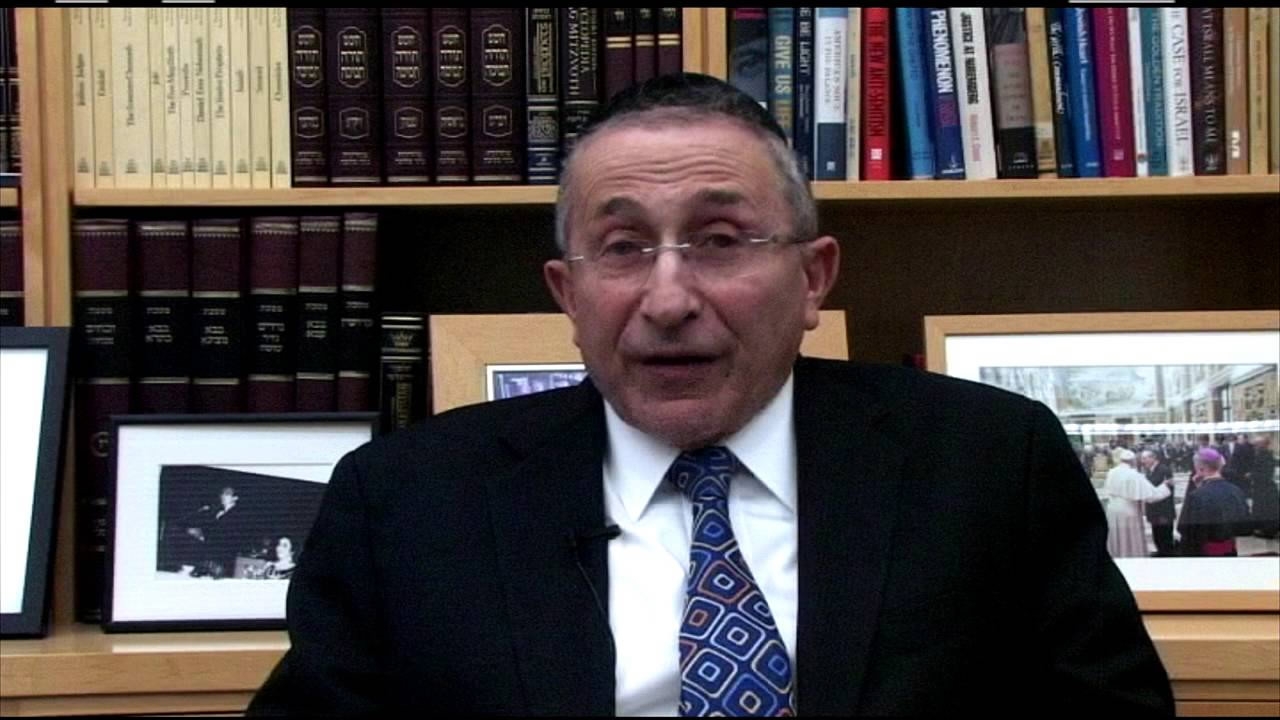
Rabbi Marvin Hier, dean and founder of the Los Angeles-based Simon Wiesenthal Center. /Photo via Youtube
Rabbi Marvin Hier, dean and founder of the Los Angeles-based Simon Wiesenthal Center. /Photo via Youtube
Undercover flirting
Ties between Bahrain and Israel date back to 1994, according to some records, when former Israeli Environment Minister Yossi Sarid agreed with the Bahraini ministers of foreign affairs and health that Israel could open an office in Manama.
While their plan did not materialize, bilateral cooperation at the highest levels took shape.
Wikileaks documents reveal that the Gulf country was in contact with the Israeli intelligence agency as far back as 2005. According to a US diplomatic cable exposed by Wikileaks, the Bahraini king told US Ambassador William T. Monroe at the time that “Bahrain already has contacts with Israel at the intelligence/security level (i.e., with Mossad), and indicated that Bahrain will be willing to move forward in other areas, although it will be difficult for Bahrain to be the first.”
Other reports have shown further meetings held by officials from both countries in later years.
But the clandestine meetings and subtle suggestions were soon followed by explicit attempts to address Israel.
Last year, Bahrain stood out among all Arab countries in publicly mourning the death of former Israeli President Shimon Peres – in a move that was widely criticized.
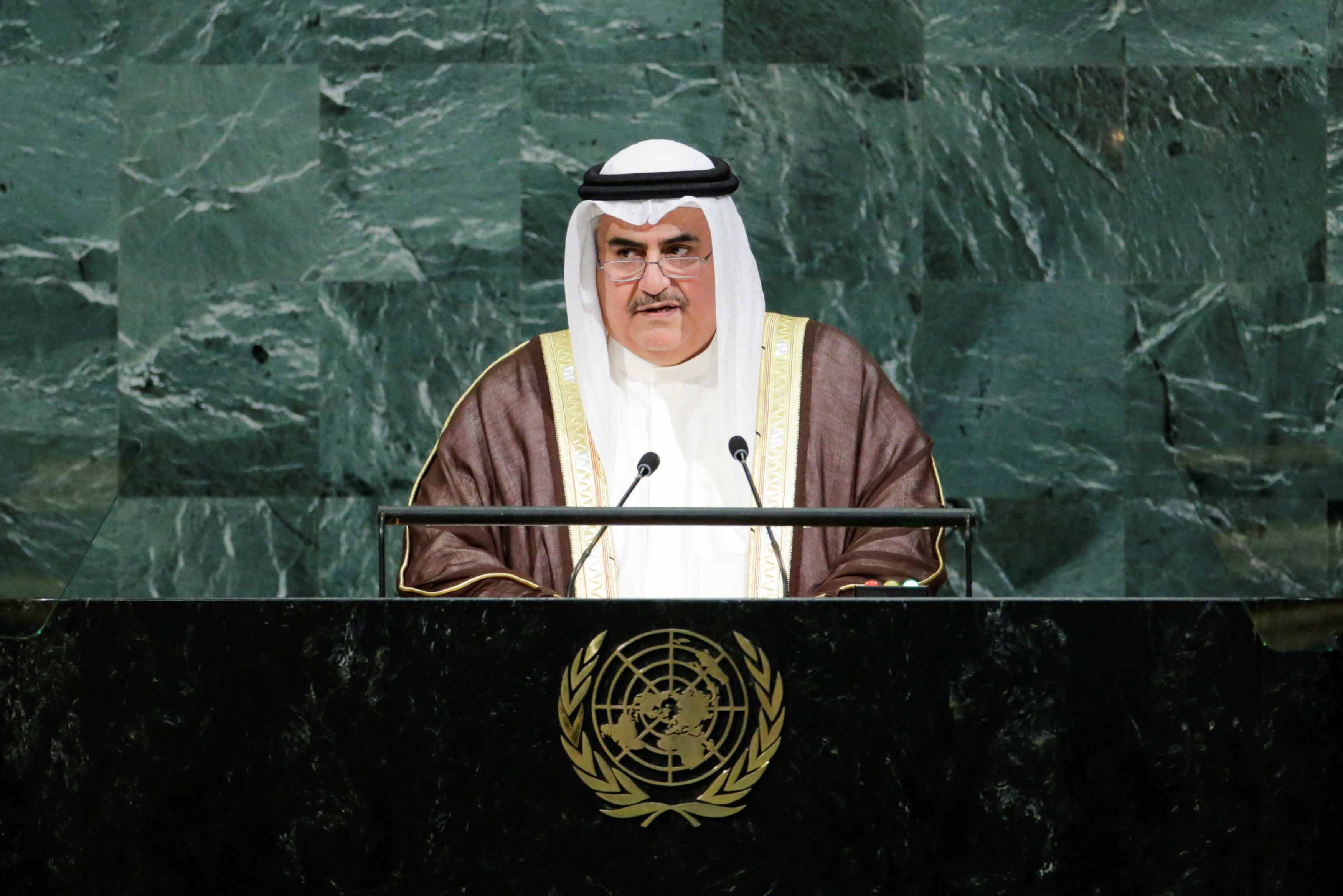
Bahrain's Minister of Foreign Affairs Shaikh Khalid bin Ahmed Al-Khalifa
addresses the 72nd United Nations General Assembly at UN headquarters in New
York, September 23, 2017. /Reuters Photo
Bahrain's Minister of Foreign Affairs Shaikh Khalid bin Ahmed Al-Khalifa addresses the 72nd United Nations General Assembly at UN headquarters in New York, September 23, 2017. /Reuters Photo
The country’s Foreign Minister Sheikh Khalid bin Ahmed Al-Khalifa took to twitter, writing: “Rest in Peace President Shimon Peres, a Man of War and a Man of the still elusive Peace in the Middle East.”
And in May this year, Manama welcomed for the first time an Israeli delegation during the 67th FIFA Congress.
The enemy of my enemy is my friend
Bahrain, a Muslim-majority nation, has a little less than 50 Jews according to estimates after the country’s Jew population moved to Israel, following its foundation in 1948.
But the friendship with Israel has not been the result of the religious links between the two; it rather comes from a mutual enemy: Iran.
Iran and Bahrain share a large Shia population, which in the latter is ruled by the Sunni minority. Manama has long been weary of Iran – the regional archival of Gulf regions – accusing it of infiltrating its territories and setting up terrorist cells to destabilize the country.
News about Bahraini authorities dismantling cells allegedly related to Iran’s Islamic Revolutionary Guard Corps and Tehran’s Lebanese ally Hezbollah often make headlines in the country. And Tehran’s rise after the landmark 2015 nuclear deal was hard for Manama to get to terms with, bringing Bahrain closer to Israel.
"Israel does not threaten our security or conspire on us but Iran certainly does," a Bahraini government source told the Middle East Eye, attempting to put the recent overtures of his country to Israel into context.

SITEMAP
Copyright © 2018 CGTN. Beijing ICP prepared NO.16065310-3
Copyright © 2018 CGTN. Beijing ICP prepared NO.16065310-3